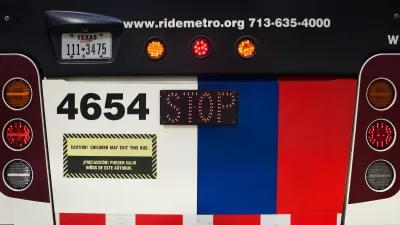After residents rejected transit expansion proposals in 2019 and 2020, local officials went back to the drawing board, removing heavy rail plans and focusing on microtransit and local buses.

Georgia’s Gwinnett County is asking its voters to approve an ambitious $17 billion Transit Development Plan that would expand on-demand transit and bus service and create a new 26-mile bus rapid transit (BRT) line.
According to an article by Jared Brey in Governing, the plan would be funded via a one-cent sales tax increase. Brey points out that “It’s a proposal with a lot of uncertainty, given that county voters rejected a similar tax in both 2019 and 2020, and voted against transit expansions in the 1990s and the 1970s.”
However, the new plan focuses on improving mobility within the county, rather than making connections to the city of Atlanta, which many in the county have long opposed. Brey explains that “residents made it clear they don’t want to be part of MARTA, and the new plan favors countywide microtransit service along with lower-cost bus rapid transit, instead of rail.”
County officials say the microtransit expansion would benefit all residents, even those who don’t use transit, by reducing congestion on local roads. A referendum has not been scheduled, but could be on the ballot next November.
FULL STORY: Atlanta Suburbs Will Try Again to Expand Public Transit

Alabama: Trump Terminates Settlements for Black Communities Harmed By Raw Sewage
Trump deemed the landmark civil rights agreement “illegal DEI and environmental justice policy.”

Planetizen Federal Action Tracker
A weekly monitor of how Trump’s orders and actions are impacting planners and planning in America.

The 120 Year Old Tiny Home Villages That Sheltered San Francisco’s Earthquake Refugees
More than a century ago, San Francisco mobilized to house thousands of residents displaced by the 1906 earthquake. Could their strategy offer a model for the present?

LA’s Tree Emergency Goes Beyond Vandalism
After a vandal destroyed dozens of downtown LA trees, Mayor Karen Bass vowed to replace them. Days later, she slashed the city’s tree budget.

Sacramento Leads Nation With Bus-Mounted Bike Lane Enforcement Cameras
The city is the first to use its bus-mounted traffic enforcement system to cite drivers who park or drive in bike lanes.

Seattle Voters Approve Social Housing Referendum
Voters approved a corporate tax to fund the city’s housing authority despite an opposition campaign funded by Amazon and Microsoft.
Urban Design for Planners 1: Software Tools
This six-course series explores essential urban design concepts using open source software and equips planners with the tools they need to participate fully in the urban design process.
Planning for Universal Design
Learn the tools for implementing Universal Design in planning regulations.
Ada County Highway District
Clanton & Associates, Inc.
Jessamine County Fiscal Court
Institute for Housing and Urban Development Studies (IHS)
City of Grandview
Harvard GSD Executive Education
Toledo-Lucas County Plan Commissions
Salt Lake City
NYU Wagner Graduate School of Public Service





























